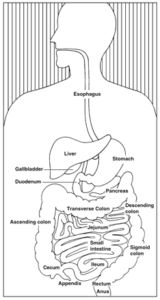This topic might be a little personal for some of you, but read it any how, because this is a serious subject – Jughandle
 How often is enough?
How often is enough?
Everyone is different as is the quantity and quality of the food we eat. Ever noticed that if you eat the same stuff over and over again that your poops start to get farther and farther apart? Also, if your diet is high in protein, which is harder to digest, your movements may be only every 2 or 3 days. A diet high in fiber, like mine has been since going vegetarian, will have you visiting the bathroom 2 or 3 times per day.
The Process
The bowels, also known as the large intestines are the lower part of your digestive system, the last stop for processing of the things you put in the other end. Speaking of your mouth, did you know that the digestive process starts there. I have heard all my life that you should chew your food completely, but I thought it was so if you had to throw up it would be easier. Not really. You chew your food to start the digestion process. Saliva produced by glands in your mouth contain enzymes that start to break down the starches in the food. These enzymes speed up the digestive process in the body. So that is why you should chew your food completely.
About 2 quarts of food and liquids make their way through our plumbing system each day, on the average. In your mouth, the saliva starts to break down the food into usable parts for your body. The stomach adds more juices to the process then moves the mess along to the small intestine. Stomach acids digest the protein in your diet. The reason your stomach acids don’t eat away at your stomach itself is because of a thick lining of mucosa that is able to resist the juice.
The stomach has three mechanical functions. It serves as a storage tank for the food and liquid you consume. That much is pretty obvious even to me. It’s next job is to mix the food with the digestive juices produced by the stomach and thirdly to move the contents slowly to the small intestine. Carbs move through the stomach the quickest, followed by protein and then fats. All this time the stomach and intestine is adding digestive fluids from the liver, pancreas and intestine to extract nutrients and further the digestive process pushing everything forward all along.
The now usable nutrients are absorbed into the body through the intestinal walls. The unusable “waste” of this process and undigested food and fiber are pushed into the colon where they remain until you have a “bowel movement”. But first, when the mix is in the small intestine, the pancreas kicks in to provide a fluid which has several enzymes that break down carbohydrates, fat and the proteins. Then the liver produces bile which is stored between uses in the gallbladder. When needed the bile is squeezed out of the gallbladder through bile ducts into the small intestine to mix with the fat in the food. The bile contains a emulsifier like substance which allows the fat to mix with the watery contents of the intestine.
Obviously, this description is a symplified version. For more information and detail go to National Digestive Diseases Information Clearinghouse
Moving, moving, moving, keep those bowels a moving….
The easiest way to stay regular is to eat fiber, drink water and exercise. Those will do the trick.
What if I’m not?
If you don’t eat a lot of fiber and you aren’t regular, the waste in your system, which includes chemicals and other nasties, will stay in your colon for a long time. Cancer and other problems are known to be caused by such conditions. Change your evil ways.
What to look for
Ideally your stool should be a torpedo, which is soft, fluffy, large and easy to pass.
If your stool is hard and dry, you maybe doing one of the following:
- Not drinking enough water
- taking drugs like blood pressure medicine, antidepressants and histamines that can slow down the GI tract.
- Eating too much dairy
- This condition is largely do to transit time
- lack of fluid
- lack of fiber
- an unbalanced diet like the Atkins diet that is low in carbohydrates
- The body passes roughly 8 liters of fluid per day. If your poop is too liquid it may be one of these:
- a viral infection – which cause the body to release fluids to get stuff out faster
- a sudden increase in fiber
- You may have colon cancer or polyps
- go to your doctor now
- You may have a liver or pancreatic disorder
- again – go to the doctor
- It may have just been the beets you ate last night
- If it is obviously red blood, you may have hemorrhoids
- go to your doctor if it is blood or the condition persists
- if it is suddenly black or tar-like it could be the iron in your supplement
- but if you don’t take iron or supplements then it could be bleeding higher up in your digestive track
- go to the doctor
- you have too much fat in your diet or
- your body isn’t absorbing the fat
- or you are eating the faux fat called Olestra
- if it continues, see your doctor
Conclusions
I’m all about enjoying life and loving the things we do and eat. Part of that, long term is to stay healthy. I’m trying to lead the way and answer questions by experimenting with a plant-based diet and doing the things I blog about before or at least during the time I’m talking about it. Don’t believe me. Do your own research, but if you know you are doing yourself harm, please change, if not for me, for you and your family. – jughandle


2 comments
I’m having a tiny problem I can’t seem to be able to subscribe your feed, I’m using google reader by the way.
Wedding photography
In the Google reader just click subscribe and enter http://www.jughandlesfatfarm.com I just did it with no problem. Thanks for following the blog. – jug